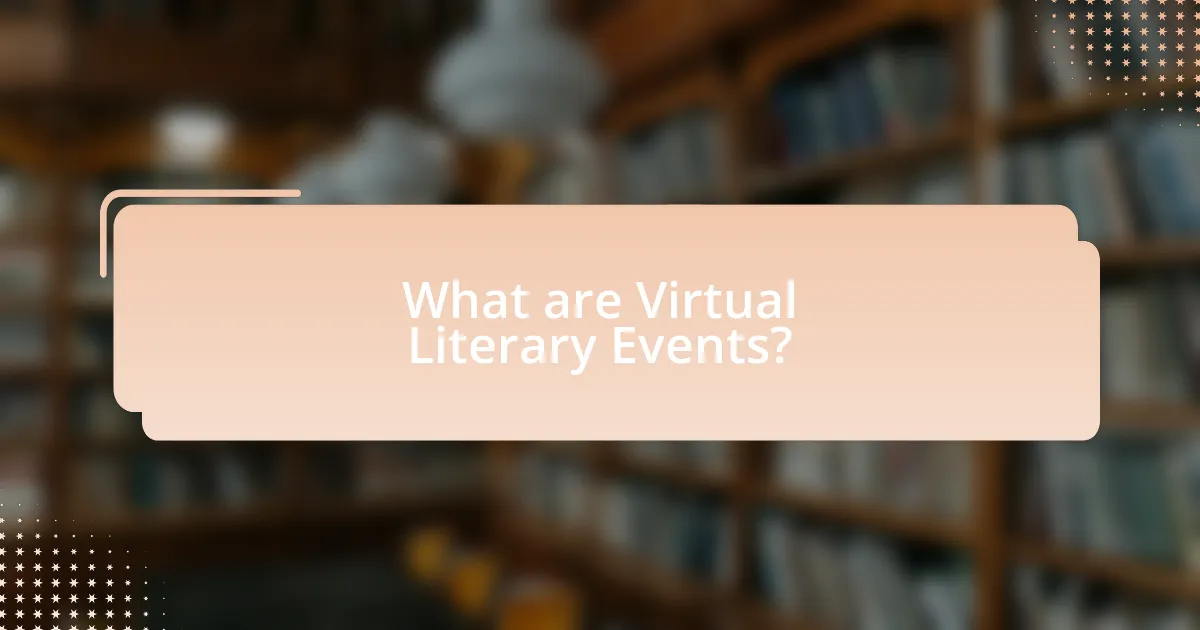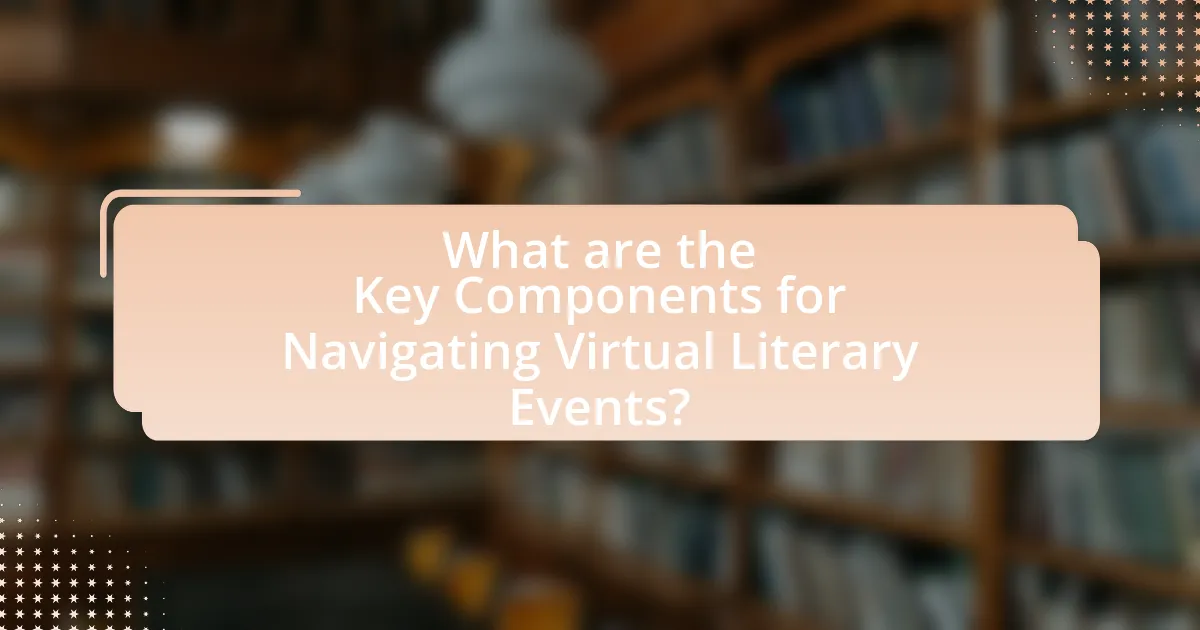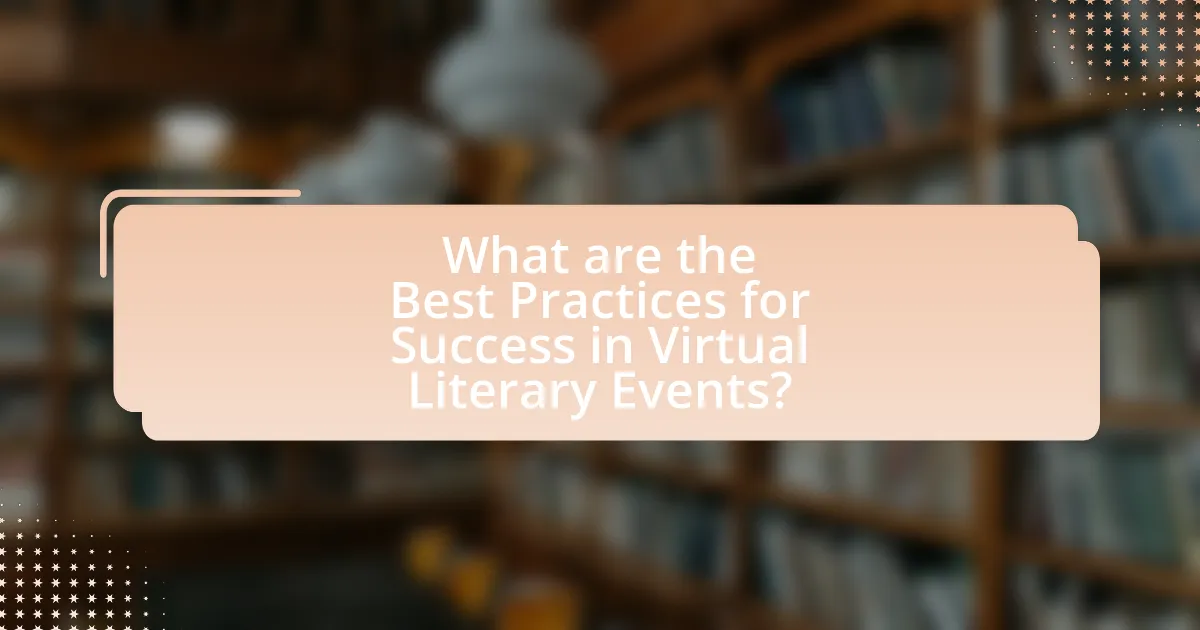Virtual literary events are online gatherings that connect authors, poets, and literary enthusiasts for discussions, readings, and workshops, utilizing digital platforms to enhance accessibility. This article explores the differences between virtual and traditional literary events, highlighting the technologies used, common formats, and the growing popularity of online gatherings, particularly during the COVID-19 pandemic. It also outlines best practices for participants to maximize their engagement and networking opportunities, while addressing common challenges such as technical issues and distractions. Key strategies for successful participation, including preparation, effective communication, and follow-up techniques, are emphasized to ensure a rewarding experience in virtual literary events.

What are Virtual Literary Events?
Virtual literary events are online gatherings where authors, poets, and literary enthusiasts engage in discussions, readings, and workshops. These events utilize digital platforms to connect participants from various locations, allowing for broader accessibility and participation. For instance, during the COVID-19 pandemic, many literary festivals transitioned to virtual formats, demonstrating the feasibility and popularity of such events.
How do Virtual Literary Events differ from Traditional Events?
Virtual literary events differ from traditional events primarily in their format and accessibility. Virtual events utilize digital platforms, allowing participants to join from anywhere, while traditional events typically require physical attendance at a specific location. This shift to virtual formats has been accelerated by advancements in technology and the need for social distancing, particularly highlighted during the COVID-19 pandemic, which saw a 300% increase in online literary events according to a report by the Association of American Publishers. Additionally, virtual events often feature interactive elements such as live chats and Q&A sessions, enhancing audience engagement compared to the more passive experience of traditional events.
What technologies are used in Virtual Literary Events?
Virtual literary events utilize technologies such as video conferencing platforms, live streaming services, and social media for engagement. Video conferencing tools like Zoom and Microsoft Teams facilitate real-time interaction among participants, while platforms like YouTube and Facebook Live enable broader audience reach through live streaming. Additionally, social media channels enhance community engagement and promote events, allowing authors and attendees to connect before, during, and after the event. These technologies collectively enhance accessibility and participation, making virtual literary events effective and interactive.
What are the common formats of Virtual Literary Events?
Common formats of virtual literary events include author readings, panel discussions, workshops, and book launches. Author readings typically feature writers presenting excerpts from their works, allowing audiences to engage with the text. Panel discussions involve multiple authors or experts discussing themes or topics related to literature, fostering dialogue and audience interaction. Workshops provide hands-on experiences where participants can develop their writing skills under the guidance of established authors. Book launches celebrate the release of new titles, often including Q&A sessions with the author. These formats have gained popularity due to their accessibility and ability to reach wider audiences through digital platforms.
Why are Virtual Literary Events becoming popular?
Virtual literary events are becoming popular due to their accessibility and convenience for a global audience. These events allow participants to engage with authors and literary discussions from the comfort of their homes, eliminating geographical barriers. According to a survey by the American Booksellers Association, 70% of respondents indicated they preferred virtual events for their ease of participation. Additionally, the COVID-19 pandemic accelerated the shift to online formats, leading to increased attendance and engagement in literary activities.
What advantages do Virtual Literary Events offer to participants?
Virtual Literary Events offer participants increased accessibility, allowing them to engage with authors and literary discussions from anywhere in the world. This format eliminates geographical barriers, enabling a diverse audience to participate without the need for travel. Additionally, these events often provide recorded sessions, allowing participants to revisit discussions and insights at their convenience. The interactive features, such as live Q&A sessions, enhance engagement and foster a sense of community among attendees. Furthermore, virtual events can often accommodate larger audiences compared to in-person gatherings, increasing the potential for networking and collaboration among participants.
How do Virtual Literary Events expand audience reach?
Virtual literary events expand audience reach by eliminating geographical barriers, allowing participants from diverse locations to engage simultaneously. This accessibility increases attendance rates, as evidenced by a 2021 survey indicating that 70% of virtual event attendees were from regions outside the host’s typical audience. Additionally, the use of social media and online platforms for promotion further amplifies visibility, attracting a wider demographic. The combination of these factors results in a significant increase in audience engagement and participation compared to traditional in-person events.

What are the Key Components for Navigating Virtual Literary Events?
The key components for navigating virtual literary events include effective technology use, active engagement, and networking opportunities. Effective technology use ensures that participants can access platforms seamlessly, as issues with connectivity or software can hinder the experience. Active engagement involves participating in discussions, asking questions, and utilizing chat features to connect with speakers and other attendees, which enhances the overall experience. Networking opportunities are crucial, as they allow attendees to build relationships with authors, publishers, and fellow readers, often facilitated through breakout rooms or social media interactions. These components collectively contribute to a successful virtual literary event experience.
How can participants prepare for a Virtual Literary Event?
Participants can prepare for a Virtual Literary Event by ensuring they have a reliable internet connection and the necessary technology, such as a computer or tablet with a webcam and microphone. This preparation is crucial because a stable internet connection minimizes disruptions during the event, allowing for seamless participation. Additionally, participants should familiarize themselves with the event platform, whether it be Zoom, Microsoft Teams, or another service, to navigate features like chat and screen sharing effectively. Research indicates that technical difficulties are a common barrier in virtual events, highlighting the importance of this preparation. Lastly, reviewing the event agenda and any required materials in advance can enhance engagement and understanding, as participants will be better equipped to follow discussions and contribute meaningfully.
What tools and platforms should be used for participation?
For participation in virtual literary events, tools and platforms such as Zoom, Microsoft Teams, and Google Meet are essential. These platforms facilitate real-time communication and interaction among participants, allowing for features like video conferencing, screen sharing, and chat functions. According to a report by Statista, as of 2021, Zoom had over 300 million daily meeting participants, highlighting its widespread use and effectiveness for virtual gatherings. Additionally, platforms like Eventbrite and Facebook Events can be utilized for organizing and promoting these events, ensuring a broader reach and better engagement with audiences.
How can attendees create an optimal virtual environment?
Attendees can create an optimal virtual environment by ensuring a distraction-free space, utilizing high-quality audio and video equipment, and engaging actively with the content. A distraction-free space minimizes interruptions, allowing attendees to focus fully on the event. High-quality audio and video equipment enhances the clarity of communication, which is crucial for understanding discussions and presentations. Active engagement, such as asking questions and participating in chats, fosters a sense of community and enhances the overall experience. Research indicates that environments with minimal distractions and high-quality technology significantly improve participant satisfaction and retention of information during virtual events.
What strategies enhance engagement during Virtual Literary Events?
Interactive elements such as live polls, Q&A sessions, and breakout discussions significantly enhance engagement during Virtual Literary Events. These strategies encourage active participation, allowing attendees to voice their opinions and ask questions in real-time, which fosters a sense of community. For instance, a study by the Pew Research Center found that interactive features in online events can increase viewer retention by up to 70%. Additionally, incorporating multimedia presentations and guest speakers can maintain interest and provide diverse perspectives, further enriching the experience for participants.
How can participants effectively interact with speakers and other attendees?
Participants can effectively interact with speakers and other attendees by utilizing chat features, asking questions during Q&A sessions, and engaging in breakout discussions. These methods facilitate direct communication and foster a sense of community. For instance, studies show that active participation in virtual events enhances networking opportunities and increases attendee satisfaction, as reported by the Event Marketing Institute in their 2021 report on virtual engagement strategies.
What role does social media play in enhancing the experience?
Social media significantly enhances the experience of virtual literary events by facilitating real-time interaction and community engagement among participants. It allows attendees to share insights, ask questions, and connect with authors and fellow readers instantly, creating a dynamic atmosphere that enriches the overall experience. For instance, platforms like Twitter and Instagram enable users to post live updates, share quotes, and participate in discussions using event-specific hashtags, which fosters a sense of belonging and immediacy. According to a study by the Pew Research Center, 69% of adults in the U.S. use social media, indicating its widespread influence and potential to enhance engagement during such events.

What are the Best Practices for Success in Virtual Literary Events?
The best practices for success in virtual literary events include thorough preparation, engaging content, and effective promotion. Thorough preparation involves testing technology beforehand to ensure a smooth experience, which is crucial as technical issues can disrupt engagement. Engaging content should be tailored to the audience, incorporating interactive elements like Q&A sessions or polls to maintain interest. Effective promotion through social media and email campaigns can significantly increase attendance, as studies show that targeted outreach can boost participation rates by up to 50%. These practices collectively enhance the overall experience for both organizers and participants, leading to successful virtual literary events.
How can participants maximize their learning and networking opportunities?
Participants can maximize their learning and networking opportunities by actively engaging in discussions, asking questions, and utilizing breakout sessions during virtual literary events. Engaging with speakers and fellow attendees fosters connections and enhances understanding of the material presented. Research indicates that interactive participation significantly improves retention of information and networking outcomes, as highlighted in a study by the Journal of Educational Psychology, which found that active involvement leads to a 50% increase in knowledge retention compared to passive listening. Additionally, following up with contacts made during the event through social media or email can solidify these connections, further enhancing networking potential.
What tips can help in effective note-taking during events?
Effective note-taking during events can be enhanced by using structured methods such as the Cornell Method, which divides notes into cues, notes, and summaries. This approach allows for better organization and retrieval of information. Additionally, actively listening and summarizing key points in your own words can improve retention and understanding. Research indicates that summarization techniques can increase comprehension by up to 30%. Utilizing digital tools like note-taking apps can also facilitate easy organization and access to notes post-event, making it simpler to review and share information.
How can attendees follow up with connections made during the event?
Attendees can follow up with connections made during the event by sending personalized messages through email or social media platforms. This approach allows attendees to express appreciation for the conversation, reference specific topics discussed, and suggest future collaboration or meetings. Research indicates that personalized follow-ups increase the likelihood of maintaining professional relationships, as they demonstrate genuine interest and engagement.
What common challenges do participants face in Virtual Literary Events?
Participants in Virtual Literary Events commonly face challenges such as technical difficulties, lack of engagement, and limited networking opportunities. Technical difficulties often include issues with internet connectivity, software glitches, and unfamiliarity with virtual platforms, which can disrupt the flow of the event. A lack of engagement arises when participants struggle to connect with speakers or other attendees, leading to a less interactive experience compared to in-person events. Additionally, limited networking opportunities hinder participants from forming meaningful connections, as virtual formats can restrict spontaneous conversations and interactions that typically occur in physical settings. These challenges can significantly impact the overall experience and effectiveness of virtual literary events.
How can technical issues be resolved during an event?
Technical issues during an event can be resolved by implementing a proactive troubleshooting plan that includes real-time monitoring and support. Event organizers should ensure that a dedicated technical support team is available to address issues as they arise, utilizing tools such as live chat or phone support to provide immediate assistance. Additionally, conducting thorough pre-event testing of all technology, including internet connections, software platforms, and audio-visual equipment, can significantly reduce the likelihood of problems during the event. Research indicates that 70% of technical issues can be prevented through proper preparation and testing, highlighting the importance of these measures in ensuring a smooth event experience.
What strategies can help manage distractions while attending virtually?
To manage distractions while attending virtually, individuals should create a dedicated workspace that minimizes interruptions. This involves selecting a quiet area, using noise-canceling headphones, and informing others of the virtual event to reduce potential disturbances. Research indicates that a well-defined workspace can enhance focus and productivity, as highlighted in a study by the American Psychological Association, which found that environmental factors significantly impact concentration levels. Additionally, utilizing tools such as website blockers can help limit access to distracting sites during the event, further supporting sustained attention.
What are the top tips for a successful experience in Virtual Literary Events?
To have a successful experience in Virtual Literary Events, participants should ensure they have a stable internet connection and familiarize themselves with the event platform beforehand. A reliable internet connection minimizes disruptions, while understanding the platform’s features, such as chat functions and Q&A options, enhances engagement. Additionally, preparing questions or topics for discussion can lead to more meaningful interactions. Research indicates that active participation increases satisfaction in virtual events, as noted in studies by the International Journal of Event Management Research, which highlight the importance of engagement for attendee experience.